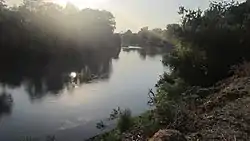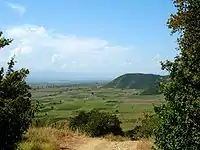Alazani
The Alazani (Georgian: ალაზანი, Azerbaijani: Qanıx) is a river that flows through the Caucasus.[1] It is the main tributary of the Kura in eastern Georgia, and flows for 351 kilometres (218 mi). Part of its path forms the border between Georgia and Azerbaijan, before it meets the Kura at the Mingəçevir Reservoir. The river is likely the same as that referred to by classical authors Strabo and Pliny as "Alazonius" or "Alazon", and may also be the Abas River mentioned by Plutarch (Plut. Pomp. 35) and Dio Cassius (37.3) as the location of the Battle of the Abas (65 BCE).[2]
| Alazani | |
|---|---|
 Alazani River near Qakh | |
| Location | |
| Countries | Georgia and Azerbaijan |
| Physical characteristics | |
| Source | |
| • location | the Greater Caucasus Range |
| Mouth | |
• location | Kura in Mingəçevir, Azerbaijan |
| Length | 391 km (243 mi) |
| Basin size | 11,455 km2 (4,423 sq mi) |

The Alazani originates in the Greater Caucasus, south of the main ridge, in the northwestern part of the Akhmeta District. It flows initially to the south towards the town Akhmeta, then through the fruitful Alazani Valley of Kakheti towards the southeast. The Alazani is the center of the Georgian wine industry. For centuries, it was a main gateway for Persian invaders.
The Alazani dries up during the winter, but in the late spring, snow melt from the mountains swells the river enormously; this regularly causes flooding. The river is mainly used for irrigation and for drinking water. In the 1990s, Chinese investors built many small hydroelectric power plants, which use the Alazani's strong current. The river is also popular with tourists for rafting trips.[3]
A light pollution of the river with biological substances comes from untreated sewage from the cities and other communities, as well as from the agricultural areas. In the districts of Kvareli and Lagodekhi, water quality is said to be quite bad.
Alazani serves also as the name of different Georgian wines, among them the semi-dry brands of Marani Alazani Valley and Old Tbilisi Alazani.
References
- United Nations. Economic Commission for Europe (2007). Our Waters: Joining Hands Across Borders : First Assessment of Transboundary Rivers, Lakes and Groundwaters. United Nations Publications. p. 5. ISBN 978-92-1-116972-0. Retrieved 7 June 2017.
-
 Smith, William, ed. (1854–1857). "Abas". Dictionary of Greek and Roman Geography. London: John Murray.
Smith, William, ed. (1854–1857). "Abas". Dictionary of Greek and Roman Geography. London: John Murray. - Ajit K. Danda (2003). Asia, Land and People. Asiatic Society. pp. 278–287. ISBN 978-81-7236-140-2. Retrieved 7 June 2017.
| Wikimedia Commons has media related to Alazani River. |
